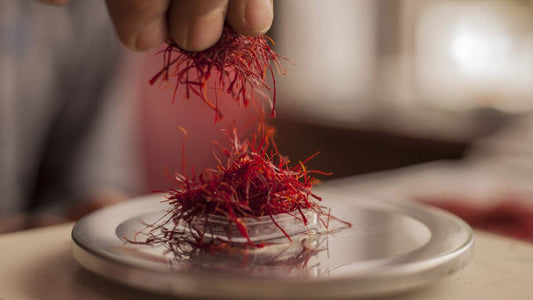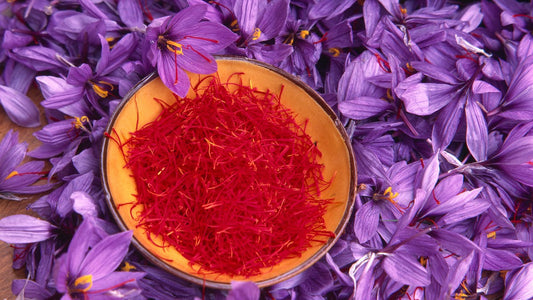Saffron and Athletic Performance: Benefits and Uses
Ara OhanianShare
Saffron, often referred to as "red gold," is a highly prized spice known for its rich flavor, vibrant color, and numerous health benefits. Beyond its culinary uses, saffron has been increasingly recognized for its potential to enhance athletic performance. This article delves into the benefits and uses of saffron for athletes, exploring how this ancient spice can contribute to improved physical performance, recovery, and overall health.
What is Saffron?
Saffron is derived from the flower of Crocus sativus. Each flower produces three vivid crimson stigmas, which are meticulously handpicked and dried to produce the spice. This labor-intensive process is one of the reasons why saffron is the most expensive spice in the world. However, its high cost is justified by its potent properties and myriad health benefits.
Nutritional Profile of Saffron
Saffron is rich in bioactive compounds such as crocin, crocetin, safranal, and picrocrocin, which contribute to its distinctive color, flavor, and aroma. These compounds are also responsible for its therapeutic effects, including antioxidant, anti-inflammatory, and neuroprotective properties. For athletes, these attributes are particularly valuable as they can aid in enhancing performance and recovery.
Benefits of Saffron for Athletes
-
Anti-Inflammatory and Antioxidant Properties
- Inflammation Reduction: Intense physical activity can lead to inflammation and oxidative stress. Saffron's anti-inflammatory properties help reduce muscle soreness and accelerate recovery.
- Oxidative Stress Mitigation: The antioxidants in saffron combat free radicals, protecting cells from damage and supporting overall cellular health.
-
Enhanced Mental Performance
- Mood Enhancement: Saffron has been shown to improve mood and reduce symptoms of depression. This can be particularly beneficial for athletes facing high-pressure situations.
- Cognitive Function: Some studies suggest that saffron can enhance cognitive functions such as memory and learning, contributing to better focus and mental clarity during training and competitions.
-
Improved Physical Performance
- Energy Boost: Saffron may enhance stamina and endurance by improving blood circulation and oxygen delivery to muscles.
- Muscle Recovery: The spice aids in muscle recovery post-exercise, reducing downtime and allowing athletes to maintain a consistent training schedule.
-
Hormonal Balance
- Testosterone Levels: Saffron has been linked to increased testosterone levels, which can enhance muscle growth and strength.
- Hormonal Health: For female athletes, saffron can help regulate menstrual cycles and alleviate PMS symptoms, ensuring consistent performance.
-
Cardiovascular Health
- Heart Health: Saffron promotes cardiovascular health by reducing cholesterol levels and improving heart function. A healthy heart is crucial for sustained athletic performance.
- Blood Pressure Regulation: The spice helps in maintaining optimal blood pressure levels, reducing the risk of hypertension-related complications during physical exertion.
How to Use Saffron for Athletic Performance
-
Dietary Supplements
- Saffron supplements are available in various forms, including capsules, powders, and tinctures. These supplements provide a concentrated dose of saffron's active compounds, making it easy for athletes to incorporate into their routines.
-
Infused Foods and Beverages
- Saffron can be added to smoothies, teas, and meals to enhance their nutritional profile. A pinch of saffron can be soaked in warm water or milk and then added to various dishes.
-
Topical Applications
- For muscle recovery, saffron-infused oils and creams can be applied topically. These products leverage saffron's anti-inflammatory properties to soothe sore muscles and joints.
Saffron Recommended Dosage and Safety
While saffron is generally safe for consumption, it is essential to adhere to recommended dosages to avoid potential side effects. The typical dosage ranges from 30 to 50 milligrams per day. Athletes should consult with a healthcare professional before incorporating saffron into their regimen, especially if they have any underlying health conditions or are taking other medications.
Saffron is a versatile spice with significant potential benefits for athletes. Its anti-inflammatory, antioxidant, and mood-enhancing properties can contribute to improved physical performance, quicker recovery, and better overall health. By incorporating saffron into their diets and training routines, athletes can harness the power of this ancient spice to achieve their performance goals.
Practical Tips for Incorporating Saffron into an Athletic Diet
Morning Routine
-
Saffron Tea or Coffee: Start your day with a saffron-infused tea or coffee. Soak a few saffron strands in warm water overnight and add it to your morning beverage. This can help boost your energy levels and improve your mood.
-
Saffron Smoothie: Add a pinch of saffron to your morning smoothie. Blend it with fruits, yogurt, and a handful of nuts for a nutrient-packed breakfast that supports recovery and provides sustained energy.
Pre-Workout Nutrition
-
Saffron-Infused Oats: Prepare overnight oats with a few strands of saffron. The anti-inflammatory properties can help prepare your muscles for the workout ahead.
-
Energy Bars: Make homemade energy bars with dates, nuts, and saffron. These bars are excellent for a pre-workout snack, providing a quick energy boost without causing digestive discomfort.
Post-Workout Recovery
-
Saffron Milk: After a strenuous workout, drink a glass of saffron-infused milk. This helps in muscle recovery and reduces soreness. To prepare, soak a few strands in warm milk for about 10 minutes.
-
Recovery Shake: Blend a recovery shake with protein powder, almond milk, a banana, and a pinch of saffron. This shake helps replenish glycogen stores and repair muscle tissues.
Saffron Recipes for Athletes
-
Saffron Quinoa Salad
- Ingredients: Quinoa, saffron, mixed vegetables (bell peppers, cucumbers, tomatoes), olive oil, lemon juice, salt, and pepper.
- Instructions: Cook quinoa and mix it with vegetables. Add saffron soaked in warm water, olive oil, lemon juice, salt, and pepper. This salad is rich in proteins, vitamins, and minerals, essential for an athlete's diet.
-
Saffron and Chicken Stir-Fry
- Ingredients: Chicken breast, saffron, mixed vegetables (broccoli, carrots, snap peas), garlic, soy sauce, and olive oil.
- Instructions: Marinate chicken with saffron and garlic. Stir-fry chicken and vegetables in olive oil, add soy sauce, and cook until done. This dish provides a good balance of proteins and carbs.
Potential Side Effects and Considerations
While saffron is beneficial, it is important to be aware of potential side effects, especially when consumed in large amounts. Excessive intake can lead to symptoms such as nausea, dizziness, and dry mouth. Therefore, moderation is key.
Research and Future Potential
-
Ongoing Studies: Numerous studies are investigating the potential benefits of saffron for athletic performance. Current research focuses on its effects on muscle strength, endurance, and recovery times.
-
Innovative Uses: The future may see innovative uses of saffron in sports nutrition, such as specialized supplements and functional foods designed specifically for athletes. This could include energy gels, protein bars, and hydration drinks infused with saffron extracts.
Real-Life Success Stories
Athletes around the world have started incorporating saffron into their diets and have reported positive results. For example, some professional runners have noted improved recovery times and reduced muscle soreness after using saffron supplements regularly.
Conclusion
Saffron is not just a luxurious spice but a powerful ally for athletes aiming to enhance their performance and recovery. Its anti-inflammatory, antioxidant, and mood-boosting properties make it a valuable addition to an athletic diet. By integrating saffron into various meals and supplements, athletes can take advantage of its numerous benefits, ensuring they stay at the top of their game.
FAQ: Saffron and Athletic Performance
What is saffron? Saffron is a spice derived from the flower of Crocus sativus, known for its rich flavor, vibrant color, and health benefits, including antioxidant and anti-inflammatory properties.
How can saffron benefit athletes? Saffron can reduce inflammation, combat oxidative stress, enhance mood and cognitive function, boost energy, aid muscle recovery, balance hormones, and support cardiovascular health.
How should athletes use saffron? Athletes can use saffron as dietary supplements, infuse it in foods and beverages, or apply it topically with saffron-infused oils and creams.
What are the recommended dosages of saffron for athletes? The typical dosage ranges from 30 to 50 milligrams per day. It's important to consult with a healthcare professional before starting any new supplement regimen.
Are there any potential side effects of saffron? While generally safe, excessive intake can cause nausea, dizziness, and dry mouth. Moderation is key to avoiding these side effects.
How can I incorporate saffron into my diet? Athletes can add saffron to morning beverages, smoothies, pre-workout snacks, post-workout recovery drinks, and various recipes such as quinoa salad and chicken stir-fry.
Are there any ongoing studies on saffron's effects on athletic performance? Yes, ongoing research is exploring saffron's impact on muscle strength, endurance, and recovery times, with future potential for specialized sports nutrition products.
Have any athletes reported success with using saffron? Yes, some professional athletes have noted improved recovery times and reduced muscle soreness after regularly using saffron supplements.




